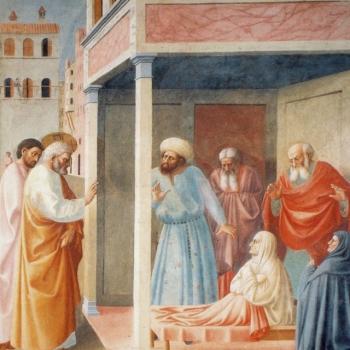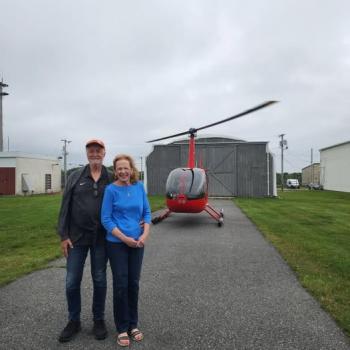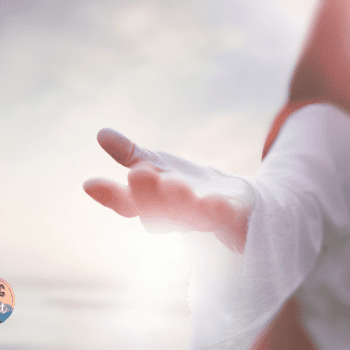Editor's Note: This is the first in a series of essays that examines the real world of Mormon missionaries and the real Elder Price. Read the author's Introduction.
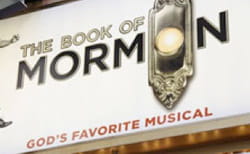 According to The Book of Mormon Musical, the Ugandan attitude toward God is "Hasa Diga Eebowai"—a fully gesticulated, profane curse against Heaven for the hardships of African life: starvation, AIDS, droughts, etc.
According to The Book of Mormon Musical, the Ugandan attitude toward God is "Hasa Diga Eebowai"—a fully gesticulated, profane curse against Heaven for the hardships of African life: starvation, AIDS, droughts, etc.
South Park humor style. But hardship in Africa is no joking matter. Missionaries there meet the realities of governmental corruption, poverty, disease, domestic abuse, alcoholism, and more. No missionary serves his full time without coming face to face with tragedy.
The Ugandans in The Book of Mormon Musical are as Americans might imagine them. The invented Ugandan curse is something Americans might predict—however inaccurately. Where there is so much death and devastation, we might presume that families would not bond tightly to their children; that in places where early death is common, parents would grieve only superficially, recover quickly, and then have more babies. "Hasa Diga Eebowai" makes that sort of supposition ("Try living here a couple days—watch all your friends and family die!"), and depicts the Ugandans shrugging over their harsh realities, and simply throwing their hands up. Though I find most of the songs in the musical fun and often accurate, "Hasa Diga Eebowai" is not one I will listen to again. I believe it perpetuates dangerous assumptions.
Why dangerous? Assuming that we can assess another's selfhood and predict reactions can shrink our compassion and reduce the other to a mere extension of our own experience, something we can contain within our finite expectations. These flattened supposals can get a laugh in a Broadway satire, but in real life, the telescopic imagination is called for. We are asked to gaze as far, as deep, and as magnanimously as possible. The only justified assumption is that we never know another's heart.
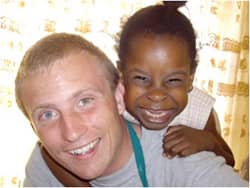 |
| Elder Price with a child |
Of course, the Mormons in the play are also flattened to suit the structures of satire, but we recognize a few of their characteristics. The mission president, for example, appears as the proverbial, patronizing white guy, oblivious to how condescending his words are. He compliments the missionaries on the work they are doing with the "noble Africans"—echoing the reference to Native Americans as "noble savages" during the 19th century, before they were corralled and exiled to the Trail of Tears. He pronounces the elders "one with Africa," and they eagerly believe them. Still utterly naïve, they sing "I Am Africa," using images from Disney's Lion King, and proclamations like "We are the Lost Boys of the Sudan" and "We are the tears of Nelson Mandela."
The real Elder Price and the Mormon boys called to Uganda or the DR-Kinshasa missions did indeed weep with the Africans, and tethered their hearts to them in ways that will affect them for the rest of their lives. There was no self-congratulation involved.
Elder Henry Lisowski wrote evocatively about the death of a 5-year-old boy from malaria:
In the corner of the room was his body. Lying shirtless and lifeless on the couch, he seemed so calm compared to the chaos that reined around him. Placed on his stomach was a warm iron, prostrate, like a plea to God himself. "Don't take him from me, not yet. Let me have just a little more time with him." The iron was to slow decomposition, something that normally hits rapidly in Africa. In this way the family could at least finish their mourning before burying him.
In the center of the room were the women, the source of the tumult. Wailing, screaming, and crying, they pounded their hands mercilessly against the concrete ground, sometimes calming down enough to look back up at the child, which would drive them into an even greater frenzy. In the corner sat the boy's uncle, our age, curled into a ball and gasping for air as tears rolled down his face. And silently sitting on the front steps was the grandfather, weeping into his hands.
And so we stood with the others, guarding the family during their time of need. There were about 40 of us crammed into that alleyway, heads hung, listening to their cries.
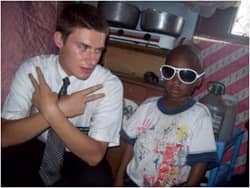 |
| Elder Lisowski playing |
